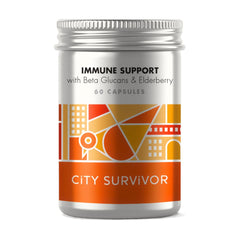We’re eagerly anticipating the warmer weather as Spring finally begins. But for an increasing number of you, it’s also the start of hay fever season; of sneezing, itchy eyes, and nasal congestion.
I’m going to explain how natural plant remedies and nutrients such as Beta Glucans, Flavonoids and Vitamins can arm you against these annoying symptoms!
But perhaps you’ve wondered if there’s any point, when supplements are costly compared to pharmaceutical antihistamine tablets?
So first let’s look at the different ways antihistamines and supplements work in your body, and then I’ll explain the benefits of powerful yet safe natural compounds for allergies.
Antihistamines vs Natural Remedies
Pharmaceutical Antihistamines work symptomatically
Histamine is released by your immune system in response to allergens including pollen; it triggers inflammatory symptoms like itching, swelling, and mucus production.
Pharmaceutical antihistamines work by blocking histamine receptors on your cells, preventing histamine from attaching and thereby reducing symptoms.
They often come with side effects such as drowsiness, dry mouth, and dizziness.
They primarily target the symptom (histamine) rather than addressing the cause - an underlying immune dysfunction that prompts the over reaction to pollen.
Natural Remedies can work on immune health
In contrast to symptom-masking antihistamines, natural remedies like Beta Glucans work to balance the underlying immune dysfunction of your allergy.
Supporting overall immune health and resilience is a proactive approach, helping to reduce the frequency and severity of allergies over time.
You also avoid side effects like drowsiness and dry nasal passages.
Immune Support for hay fever season
- Beta Glucans 1,3/1,6
- Elderberry
- Vitamin C
- Vitamin A
- Zinc
Proactively taking City Survivor Immune Support before hay fever symptoms start is a safe and effective preparation for pollen season.
Let's see how these ingredients work synergistically to bolster your immune system.
Beta Glucans 1,3/1,6
I call Beta Glucans the magical modulator!
Where other natural immune boosters like echinacea may over stimulate the immune system with extended use, Beta Glucans are safe for long term use.
They not only strengthen immune responses, but also reduce hyperactive immune responses like allergies.
Elderberry Extract
Elderberry (Sambucus nigra) is a hedgerow treasure, and most people know it as a winter cough remedy.
However, being loaded with flavonoids (anti-inflammatory & antioxidant plant chemicals) including quercetin and rutin, this beautiful berry extract can also help reduce inflammatory responses to allergens.
In fact, Quercetin is often sold in health stores as a natural antihistamine!
Vitamin C
Vitamin C helps reduce the amount of histamine your body produces. This contrasts to pharmaceuticals which block histamine receptors.
How to use Immune Support for hay fever season
Just as increasing immune nutrient intake preventatively helps you catch fewer coughs and colds, prevention is key to lessening allergy suffering through spring and summer.
Start incorporating Immune Support into your daily routine in advance of your normal symptomatic period.
Immune Support has been carefully formulated to safely take several times per day.
This is to give a constant drip feed of nutrients throughout the day and is more effective than taking mega doses once daily.
- Before symptoms begin, take 1-2 capsules daily.
- When suffering allergy symptoms, increase to 4 capsules daily - 1 with each meal and 1 before bed.
Combine with other safe and natural allergy precautions:
- Apply Haymax or natural lip balm around the nostrils and eye bones to trap pollen
- Shower before bed
- Launder outdoor clothes daily
- Vacuum, dust and use HEPA filters
- Saline nasal spray
References and further reading
https://www.ncbi.nlm.nih.gov/pmc/articles/PMC3951572/


